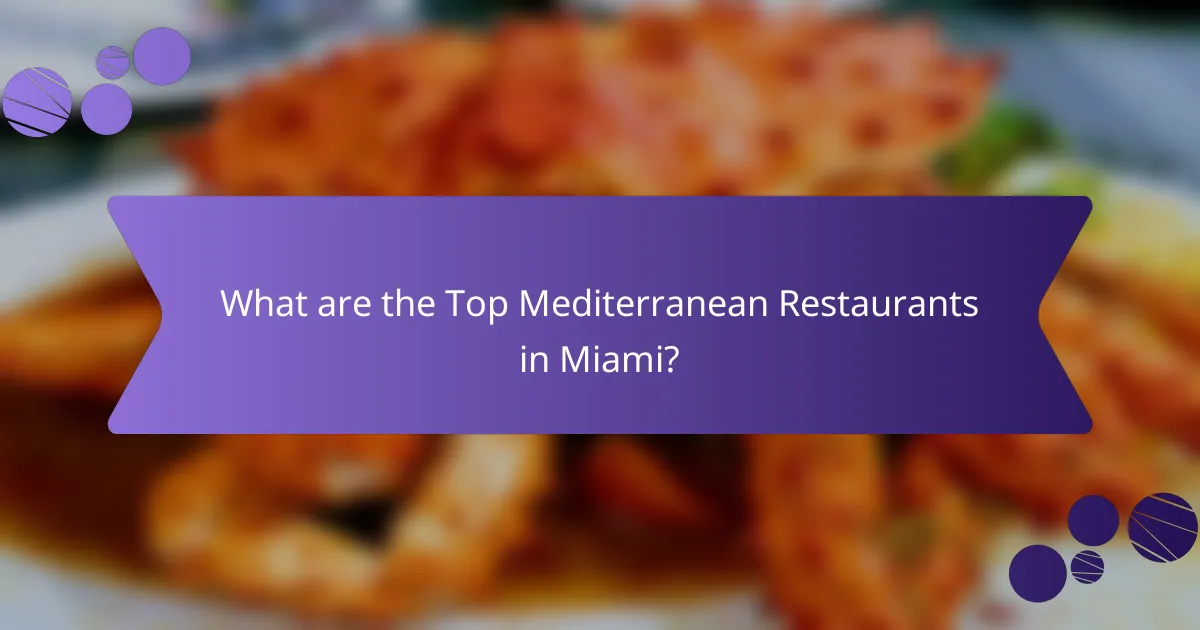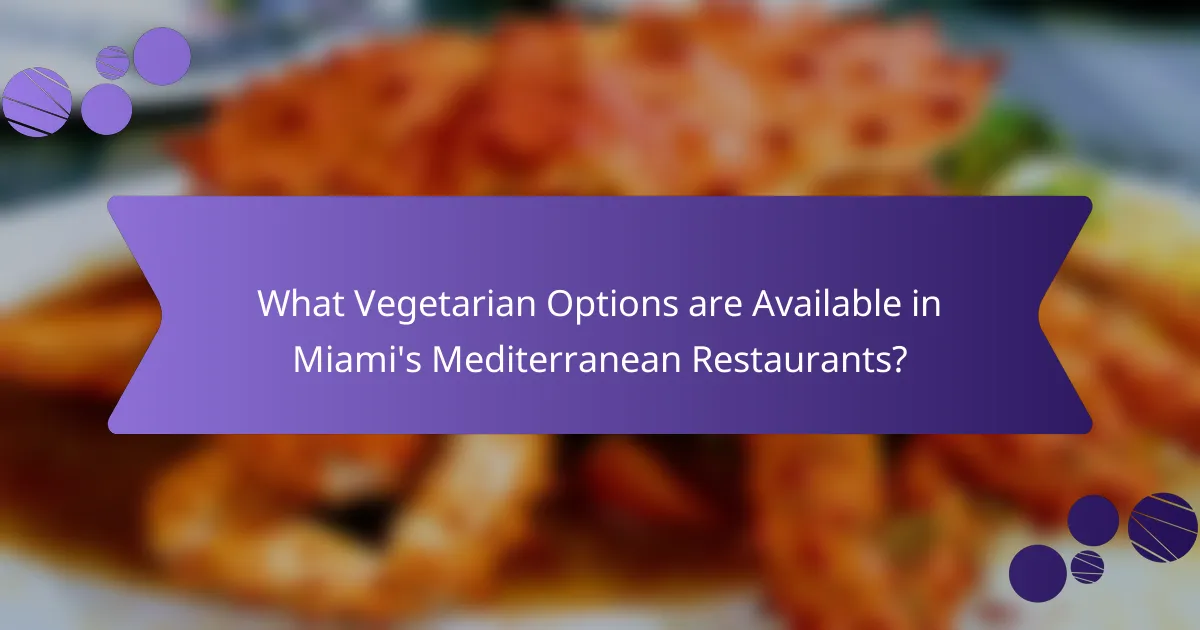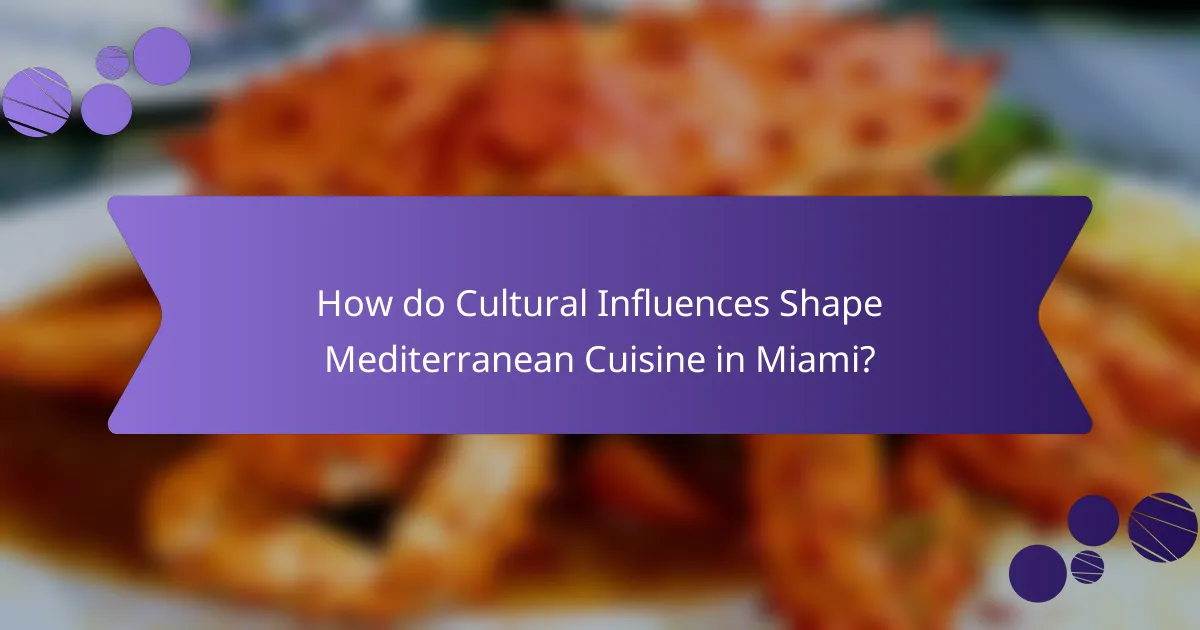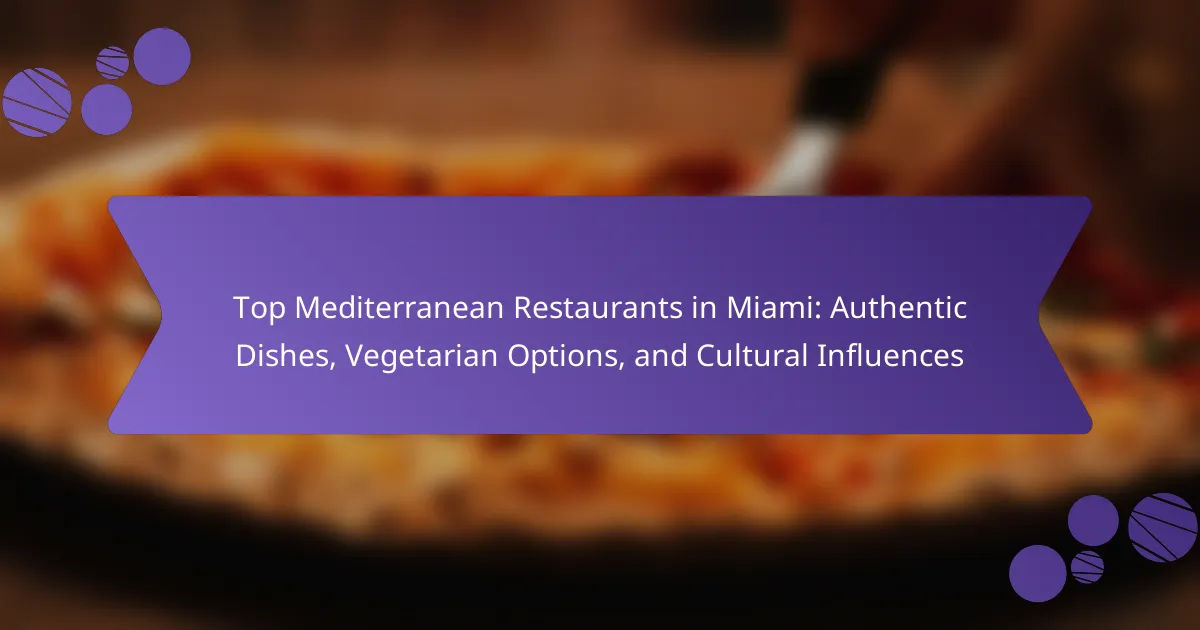
What are the Top Mediterranean Restaurants in Miami?
Zuma, Mandolin Aegean Bistro, and Cvi.che 105 are top Mediterranean restaurants in Miami. Zuma offers a modern twist on traditional Japanese and Mediterranean cuisine. Mandolin Aegean Bistro serves authentic Greek and Turkish dishes in a charming setting. Cvi.che 105 specializes in Peruvian cuisine with Mediterranean influences. These restaurants are well-rated for their quality and atmosphere. They provide a variety of vegetarian options and authentic dishes. Each restaurant reflects the rich cultural influences of the Mediterranean.
How do these restaurants embody authentic Mediterranean cuisine?
These restaurants embody authentic Mediterranean cuisine through their use of traditional ingredients and cooking methods. They source fresh vegetables, olive oil, and herbs, which are staples in Mediterranean dishes. Many of the dishes reflect regional specialties, such as Greek moussaka or Italian risotto. The menus often feature seafood, grilled meats, and vegetarian options, showcasing the diversity of the Mediterranean diet. Additionally, the restaurants emphasize communal dining experiences, which is a cultural aspect of Mediterranean meals. Many chefs have roots in Mediterranean countries, bringing authentic recipes and techniques to their cooking. The ambiance often mirrors traditional Mediterranean settings, enhancing the dining experience.
What key dishes define authenticity in Mediterranean restaurants?
Key dishes that define authenticity in Mediterranean restaurants include hummus, falafel, tabbouleh, moussaka, and tzatziki. Hummus is a traditional spread made from chickpeas and tahini. Falafel consists of deep-fried balls made from ground chickpeas or fava beans. Tabbouleh is a refreshing salad made with parsley, tomatoes, and bulgur wheat. Moussaka is a layered casserole typically made with eggplant and ground meat. Tzatziki is a yogurt-based sauce flavored with cucumber and garlic. These dishes reflect the diverse culinary heritage of the Mediterranean region. They are staples in countries like Greece, Lebanon, and Turkey, showcasing regional ingredients and cooking techniques.
What ingredients are commonly used in authentic Mediterranean dishes?
Common ingredients in authentic Mediterranean dishes include olive oil, garlic, and fresh herbs. Olive oil serves as a primary fat source and flavor enhancer. Garlic adds depth and aroma to many recipes. Fresh herbs like basil, oregano, and parsley contribute vibrant flavors. Vegetables such as tomatoes, eggplants, and bell peppers are staples in Mediterranean cuisine. Legumes, particularly chickpeas and lentils, provide protein and fiber. Additionally, grains like rice and couscous are commonly used as side dishes. Seafood is also prevalent, especially in coastal regions, offering fresh and healthy options. These ingredients reflect the region’s agricultural diversity and culinary traditions.
Why is Miami a hub for Mediterranean dining?
Miami is a hub for Mediterranean dining due to its diverse culinary landscape and cultural influences. The city’s large population of Mediterranean immigrants contributes to the availability of authentic dishes. Miami’s geographical location also facilitates the import of fresh ingredients from Mediterranean regions. This enhances the authenticity and quality of the cuisine offered. Additionally, the city’s vibrant food scene attracts chefs who specialize in Mediterranean cooking. Numerous restaurants showcase a variety of Mediterranean flavors and cooking techniques. The popularity of health-conscious dining further boosts interest in Mediterranean cuisine, known for its fresh ingredients and healthy options. Miami’s food festivals often highlight Mediterranean dishes, reinforcing the city’s status as a culinary destination.
What cultural influences shape the Mediterranean restaurant scene in Miami?
The Mediterranean restaurant scene in Miami is shaped by diverse cultural influences. These influences include Latin American, Middle Eastern, and European traditions. The city’s multicultural population brings various culinary practices and flavors. For instance, Cuban and Venezuelan cuisines blend with Mediterranean dishes. This fusion creates unique offerings like falafel tacos and hummus with plantains. Additionally, local seafood influences Mediterranean recipes, enhancing freshness. The vibrant art scene also promotes Mediterranean dining experiences. Festivals celebrate Mediterranean heritage, further enriching the restaurant landscape. Miami’s cultural melting pot fosters innovation in Mediterranean cuisine.
How does Miami’s diverse population impact Mediterranean cuisine offerings?
Miami’s diverse population significantly enhances Mediterranean cuisine offerings. The city’s multicultural demographic includes large communities from Latin America, the Middle East, and Europe. This mix creates a fusion of flavors and cooking techniques. Restaurants often incorporate local ingredients into traditional Mediterranean dishes. For example, you may find dishes that combine classic Greek recipes with Cuban spices. Additionally, the presence of diverse culinary traditions leads to innovative vegetarian and vegan options. This adaptability caters to various dietary preferences and cultural tastes. Overall, Miami’s diversity enriches the authenticity and variety of Mediterranean cuisine available in the city.

What Vegetarian Options are Available in Miami’s Mediterranean Restaurants?
Miami’s Mediterranean restaurants offer a variety of vegetarian options. Common dishes include falafel, hummus, and baba ganoush. Many places serve stuffed grape leaves and tabbouleh salad. Grilled vegetable skewers are also popular. Some restaurants feature lentil soup and couscous salads. Additionally, eggplant moussaka is a frequently available dish. These options reflect traditional Mediterranean cuisine. They cater to diverse dietary preferences in the Miami area.
Which Mediterranean dishes cater specifically to vegetarians?
Mediterranean dishes that cater specifically to vegetarians include falafel, hummus, tabbouleh, and ratatouille. Falafel consists of ground chickpeas formed into balls and fried. Hummus is a spread made from blended chickpeas, tahini, and olive oil. Tabbouleh is a salad featuring parsley, tomatoes, and bulgur wheat. Ratatouille is a vegetable stew made with zucchini, eggplant, and bell peppers. These dishes are staples in Mediterranean cuisine and are widely available in restaurants. They provide a range of flavors and nutrients suitable for vegetarian diets.
What are the health benefits of vegetarian Mediterranean cuisine?
Vegetarian Mediterranean cuisine offers numerous health benefits. It is rich in plant-based foods, which are high in essential nutrients. These foods include fruits, vegetables, whole grains, legumes, and nuts. This diet is associated with lower risks of heart disease. Studies show that it can reduce cholesterol levels and improve blood pressure. Additionally, it supports weight management due to its high fiber content. The Mediterranean diet is also linked to a lower incidence of type 2 diabetes. It provides antioxidants that combat oxidative stress and inflammation. Overall, vegetarian Mediterranean cuisine promotes overall well-being and longevity.
How do Mediterranean restaurants in Miami accommodate vegetarian diets?
Mediterranean restaurants in Miami accommodate vegetarian diets by offering a diverse range of plant-based dishes. These establishments typically feature ingredients such as fresh vegetables, legumes, grains, and herbs. Many menus include options like falafel, hummus, tabbouleh, and stuffed grape leaves. Seasonal vegetables are often grilled or roasted to enhance flavor. Additionally, some restaurants provide customizable dishes to cater to specific dietary preferences. The Mediterranean diet is inherently rich in vegetarian choices, making it easier for these restaurants to cater to non-meat eaters. This variety ensures that vegetarian patrons can enjoy authentic Mediterranean flavors while adhering to their dietary needs.
What unique vegetarian dishes should you try?
Unique vegetarian dishes to try include Spanakopita, a savory Greek pastry filled with spinach and feta. Another option is Ratatouille, a traditional French vegetable stew that showcases seasonal produce. You should also try Falafel, which are deep-fried chickpea balls, commonly served in Middle Eastern cuisine. Additionally, consider Shakshuka, a North African dish featuring poached eggs in a spicy tomato sauce. Lastly, explore Caprese Salad, an Italian dish made with fresh mozzarella, tomatoes, and basil. Each of these dishes highlights the rich flavors and ingredients typical of Mediterranean cuisine.
What are the most popular vegetarian appetizers in Mediterranean cuisine?
Hummus, baba ghanoush, and tabbouleh are among the most popular vegetarian appetizers in Mediterranean cuisine. Hummus is a creamy dip made from blended chickpeas, tahini, lemon juice, and garlic. Baba ghanoush features roasted eggplant blended with tahini, garlic, and lemon juice. Tabbouleh is a fresh salad made with parsley, mint, tomatoes, and bulgur wheat. These dishes are widely enjoyed across Mediterranean countries. They are often served with pita bread or fresh vegetables. The popularity of these appetizers is rooted in their rich flavors and healthy ingredients.
Which main courses offer the best vegetarian options?
Mediterranean cuisine offers several main courses with excellent vegetarian options. Dishes such as falafel, stuffed grape leaves, and ratatouille are popular choices. Falafel is made from ground chickpeas and spices, often served in pita bread. Stuffed grape leaves, known as dolmas, are filled with rice and herbs. Ratatouille is a vegetable stew featuring eggplant, zucchini, and bell peppers. These dishes highlight the rich flavors of Mediterranean ingredients. Many Mediterranean restaurants in Miami feature these options prominently on their menus. They cater to vegetarian diets while maintaining authentic culinary traditions.

How do Cultural Influences Shape Mediterranean Cuisine in Miami?
Cultural influences shape Mediterranean cuisine in Miami by integrating diverse culinary traditions. The city’s population includes a significant number of immigrants from Mediterranean countries. These communities contribute authentic recipes and cooking techniques. Ingredients such as olive oil, fresh vegetables, and seafood are prevalent in local dishes. Miami’s restaurants often blend traditional Mediterranean flavors with Latin American influences. This fusion creates unique offerings not found in other regions. Events like food festivals showcase this culinary diversity. Overall, cultural exchange enriches the Mediterranean dining experience in Miami.
What are the major cultural influences on Mediterranean dining in Miami?
Mediterranean dining in Miami is significantly influenced by diverse cultural backgrounds. The city’s large Hispanic and Caribbean populations contribute flavors and ingredients to Mediterranean cuisine. Cuban, Puerto Rican, and Dominican influences often blend with traditional Mediterranean dishes. Additionally, the Jewish community introduces Middle Eastern elements, enhancing the culinary landscape. Italian immigrants have also left a lasting impact, especially through pasta and pizza variations. The fusion of these cultures creates unique dining experiences. Miami’s vibrant food scene reflects this multiculturalism, attracting food enthusiasts. The result is a rich tapestry of flavors that defines Mediterranean dining in the city.
How do immigrant communities contribute to the diversity of Mediterranean cuisine?
Immigrant communities enrich Mediterranean cuisine by introducing diverse culinary traditions and ingredients. These communities bring unique recipes that reflect their cultural heritage. For example, Middle Eastern immigrants have popularized dishes like shawarma and falafel in Mediterranean restaurants. North African influences add spices and flavors such as harissa and preserved lemons. Additionally, the blending of various cooking techniques enhances the overall dining experience. This fusion leads to innovative dishes that attract a broader audience. The result is a vibrant culinary landscape that showcases the region’s multicultural identity. Studies show that immigrant contributions significantly increase the variety of available Mediterranean dishes.
What role does local culture play in the adaptation of Mediterranean dishes?
Local culture significantly influences the adaptation of Mediterranean dishes. Each region incorporates its unique ingredients and cooking methods. For example, in Miami, Latin flavors merge with traditional Mediterranean recipes. This fusion creates distinct variations, such as using plantains in place of potatoes. Furthermore, local dietary preferences, like vegetarianism, shape dish modifications. Cultural celebrations also inspire seasonal dishes that reflect local customs. The presence of diverse communities in Miami enhances these adaptations. They introduce new culinary techniques and flavors, enriching the Mediterranean cuisine experience. Overall, local culture plays a crucial role in evolving Mediterranean dishes into regionally beloved favorites.
How can you experience the cultural richness of Mediterranean restaurants in Miami?
You can experience the cultural richness of Mediterranean restaurants in Miami by exploring diverse culinary offerings. Visit restaurants that serve traditional dishes from various Mediterranean countries. Engage with the staff to learn about the origins of the dishes. Attend cultural events or themed nights hosted by these restaurants. Sample authentic ingredients like olive oil, spices, and fresh produce. Participate in cooking classes offered by some establishments. Enjoy live music or performances that reflect Mediterranean traditions. Miami’s vibrant Mediterranean community enhances the dining experience through cultural immersion.
What events or festivals celebrate Mediterranean culture and cuisine in Miami?
Miami hosts several events and festivals that celebrate Mediterranean culture and cuisine. The Miami Mediterranean Food and Wine Festival is a prominent event featuring Mediterranean food tastings, wine pairings, and cooking demonstrations. This festival showcases diverse culinary traditions from countries like Greece, Italy, and Spain. Another significant event is the Calle Ocho Festival, which celebrates Latin and Mediterranean influences in food and music. The South Beach Wine & Food Festival also includes Mediterranean-themed events, highlighting local Mediterranean restaurants and chefs. These festivals collectively promote the rich culinary heritage of the Mediterranean in Miami.
How can you engage with the Mediterranean community through dining experiences?
Engaging with the Mediterranean community through dining experiences can be achieved by hosting cultural events. These events can feature traditional Mediterranean dishes, which promote authentic culinary practices. Offering cooking classes can also enhance engagement by allowing community members to share their skills. Collaborating with local Mediterranean chefs can provide authenticity in the dining experience. Additionally, creating themed nights that celebrate specific Mediterranean cultures can attract diverse audiences. Incorporating live music or dance performances can further enrich the dining atmosphere. Research shows that cultural dining experiences foster community connections and appreciation for diverse traditions.
What tips should you consider when dining at Mediterranean restaurants in Miami?
When dining at Mediterranean restaurants in Miami, consider trying a variety of small plates, known as mezze. This allows you to sample different flavors and dishes. Look for restaurants that use fresh, local ingredients. Many Mediterranean dishes are made with seasonal produce, enhancing their taste. Pay attention to the specials, as they often feature authentic and unique offerings. Be open to trying dishes that may be unfamiliar. Mediterranean cuisine has diverse options, including vegetarian and seafood dishes. Lastly, ask your server for recommendations based on your preferences. This can lead to a more enjoyable dining experience.
The main entity of the article is Mediterranean restaurants in Miami, which are celebrated for their authentic dishes, diverse vegetarian options, and rich cultural influences. The article highlights top dining establishments such as Zuma, Mandolin Aegean Bistro, and Cvi.che 105, emphasizing their unique offerings and commitment to traditional Mediterranean cuisine. It explores key ingredients, popular vegetarian dishes, and the impact of Miami’s multicultural population on the culinary landscape. Additionally, the article discusses how local culture and immigrant communities contribute to the adaptation and innovation of Mediterranean dishes in the city.




